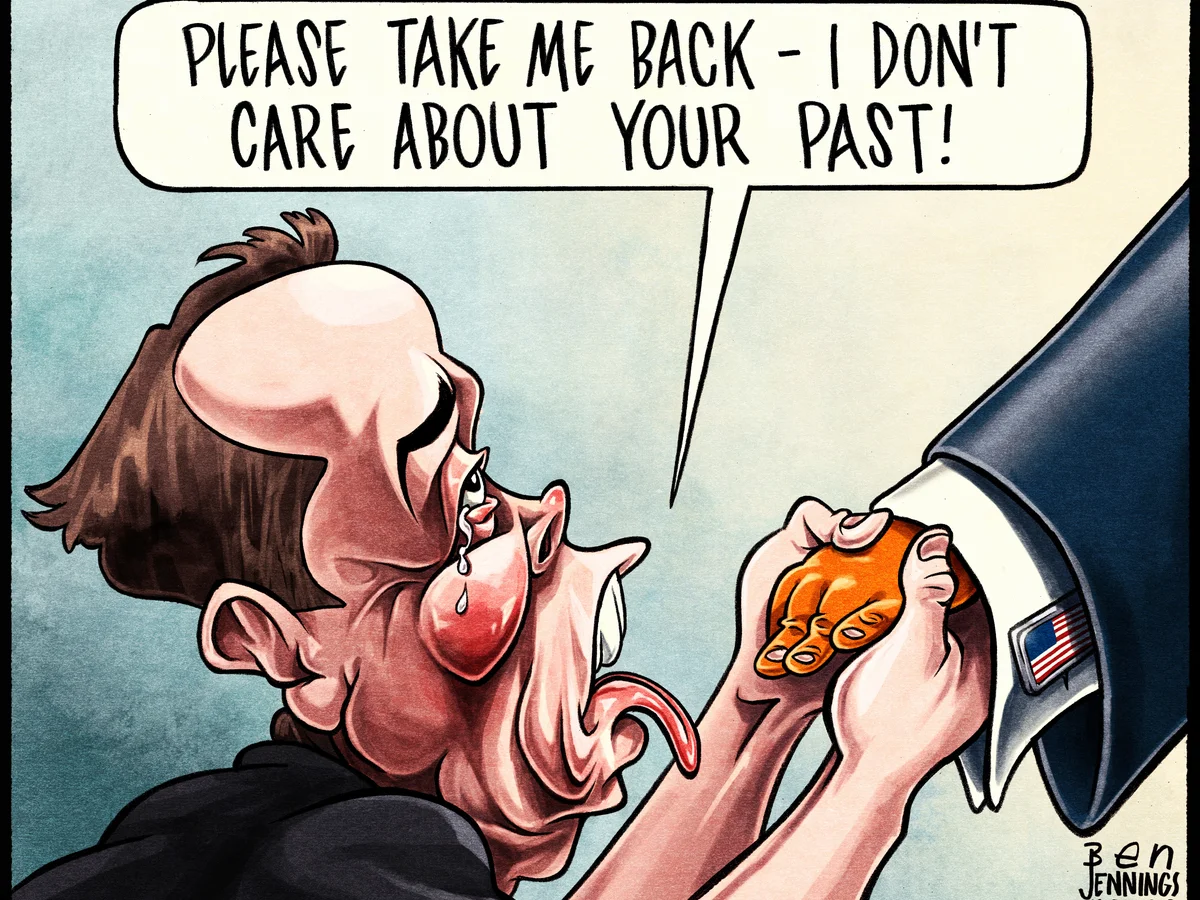
A Cartoon’s Commentary: Ben Jennings on Elon Musk’s Post-Feud Remorse with Donald Trump
Decoding the Nuances of Power, Public Image, and Political Reconciliation Through a Master Cartoonist’s Eye.
Anne Martin 13 June 2025
In the ever-unfolding drama of political and tech titans, few spectacles capture public attention quite like a high-profile feud. The recent public spat between billionaire entrepreneur Elon Musk and former President Donald Trump provided ample material for headlines, social media discourse, and, notably, the sharp wit of political cartoonists. Renowned cartoonist Ben Jennings, with his incisive commentary and distinctive style, recently weighed in on this very dynamic, depicting Musk’s apparent show of remorse after their very public falling out. Jennings’ work goes beyond mere caricature; it offers a critical lens through which to examine themes of power, public image management, and the often-unpredictable dance of political reconciliation.
Ben Jennings is known for his ability to distill complex political narratives into single, impactful images. His cartoons, regularly featured in prominent publications, are not just illustrations but potent critiques, often employing metaphor and subtle visual cues to convey deeper meaning. In this particular instance, Jennings’ commentary on the Musk-Trump dynamic captures a pivotal moment: the aftermath of a highly publicized feud and Musk’s subsequent attempt to mend fences, or at least soften the public perception of the rift.
The Unlikely Alliance and Its Public Unraveling
The relationship between Elon Musk and Donald Trump has been a fascinating study in contrasts and convenient alliances. Historically, figures like Musk, often seen as disruptive innovators, have navigated the political landscape with a mix of engagement and strategic distance. For a period, Musk served on advisory councils during the Trump administration, and their relationship appeared to be one of mutual benefit, with Musk providing a veneer of tech-world endorsement and Trump occasionally engaging with Musk’s ventures.
However, this alliance began to unravel publicly, culminating in a series of sharp exchanges, particularly on social media platforms where both figures hold immense influence. The feud reportedly escalated over various policy disagreements, including Trump’s stance on tariffs and a “Big, Beautiful Bill” that Musk publicly criticized for increasing the national deficit and potentially undermining tax incentives beneficial to his companies, like Tesla. The verbal jabs quickly turned personal, with both men leveraging their massive online followings to air grievances and accusations. Musk even made unsubstantiated claims regarding Trump’s alleged connections to the Jeffrey Epstein files, which added a particularly inflammatory dimension to the dispute. This very public airing of grievances demonstrated the fragility of even high-level political-business relationships when core interests or personal pride are challenged.
Decoding Remorse: Strategy or Sincerity?
Jennings’ cartoon focuses on the “show of remorse” from Elon Musk. This isn’t merely about an apology; it invites viewers to question the motivations behind such a public softening of tone. In the world of high-stakes business and politics, public displays of regret or reconciliation are rarely purely emotional. They are often strategic maneuvers designed to manage public perception, mitigate potential damage, or prepare for future opportunities.
Musk’s past posts included endorsing calls for Trump’s impeachment and highly critical remarks about his policies. The subsequent expression of “regret” for some of his posts, admitting they “went too far,” suggests a calculated move. It could be an acknowledgment of the potential business implications of alienating a political figure with significant influence over government contracts and regulatory bodies. Companies like SpaceX and Tesla, heavily reliant on federal contracts and policies, can be vulnerable to political disfavor. Jennings’ cartoon prompts reflection on whether this “remorse” is a genuine change of heart or a pragmatic decision to de-escalate a conflict that had become detrimental. It highlights the intricate dance between personal opinion, public image, and corporate interest.
The Power of the Political Cartoon as Commentary
Ben Jennings’ role as a political cartoonist is crucial in this context. Cartoons, by their very nature, simplify and satirize, but in doing so, they often reveal deeper truths that conventional news reporting might obscure. Jennings uses visual shorthand to convey complex political dynamics, often distilling the essence of a situation into a single, memorable image. His work on the Musk-Trump dynamic serves as a form of social commentary, allowing the public to engage with political events in a way that is both accessible and thought-provoking.
A well-crafted political cartoon captures the absurdity, hypocrisy, or underlying tension of a moment. In this instance, by highlighting Musk’s remorse, Jennings not only reflects a recent news development but also invites viewers to consider the broader implications of power dynamics between influential figures, the role of social media in escalating and de-escalating conflicts, and the perpetual human desire for image control. The cartoon becomes a visual metaphor for the high-stakes chess game played by these figures in the public arena.
Beyond the Feud: Implications for Public Discourse
The Musk-Trump feud, and Jennings’ commentary on it, offers a broader lesson about the nature of public discourse in the digital age. Social media platforms, while enabling direct communication, also amplify disagreements and often devolve into public spectacle. The rapid escalation and de-escalation of such feuds underscore the volatility of online interactions, particularly when involving figures with immense platforms.
Jennings’ cartoon, in its concise yet potent form, reminds us to look beyond the immediate headlines and consider the strategic intent behind public statements and displays of emotion. It’s a testament to the enduring power of satirical art to hold up a mirror to society and its most influential figures, prompting deeper reflection on the motives and consequences of their actions in the public sphere. Ultimately, it emphasizes that even in the chaotic theater of modern politics, image, influence, and the perception of sincerity remain powerful currencies.
#BenJennings #ElonMusk #DonaldTrump #PoliticalCartoon #PublicImage #Feud #SocialMedia #PoliticalCommentary #TechTitans #USPolitics